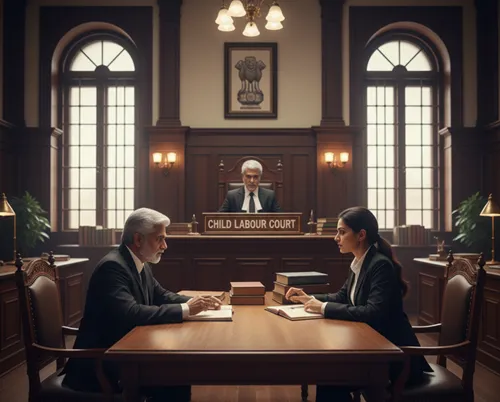
The main law is Child and Adolescent Labour (Prohibition & Regulation) Act, 1986, as amended in 2016.
- The 2016 amendment (effective 1 September 2016) made key changes.
- A "Schedule" defines hazardous occupations and processes.
- The amendment also introduced the concept of adolescents (ages 14–18) with restrictions on hazardous work.
- Implementation (inspections, enforcement) is carried out by State Governments (except for central‐domains like mines, railways) via labour departments.
- The government uses a portal "PENCIL" for enforcement support.
Key Provisions & Rules (with examples)
| Category | What the Law Says | Example / Clarification |
|---|---|---|
| Definition: Child & Adolescent | "Child" means person who has not completed 14 years. "Adolescent" means 14–18 years. | |
| Prohibition for children (below 14 years) | No child shall be employed in any occupation or process. | A 13-year-old cannot be hired even in a shop / office |
| Exception for children helping family | A child may help his own family outside hazardous processes, and only after school hours or during vacations. | A child can help in a family store (non-hazardous) after school |
| Adolescents (14–18 years) | They may be employed in non-hazardous occupations/processes. But prohibited in hazardous jobs. | A 16-year-old can work in a retail shop, but not in mining or beedi manufacture |
| Hazardous jobs (for adolescents, and children even as helpers) | The Schedule (effective 30 August 2017) lists hazardous occupations where adolescents are barred. Also, 107 occupations where children, even as helpers, are barred. | Mining, work with explosives, chemical processes, mica mines (these are explicitly prohibited) |
| Working hours / conditions (adolescents in allowed jobs) | The Act mandates regulation of conditions (hours, breaks) for adolescents. | Maximum 6 hours a day, a rest break after 3 hours (this is prescribed in rules) (implied via rules) |
| Penalty / Offence & Cognizability | Violation is a cognizable offence; punishable by imprisonment (6 months to 2 years) and fine (₹20,000 to ₹50,000). Repeat offence penalties may be higher. | Employer hiring a child may face arrest without warrant, court case, fine |
| Rehabilitation & Funding | The Act provides for a Child & Adolescent Labour Rehabilitation Fund (financed by penalties) and schemes for rescue, rehabilitation via NCLP. | A rescued child is given bridge education, vocational training, stipend under NCLP. |
| Rules & SOPs | The Child Labour (Prohibition & Regulation) Rules, 2017 specify duties of state authorities, record-keeping. Also SOPs exist for enforcement. | State governments must inspect, maintain registers of adolescent workers, ensure enforcement |
| Inclusion of mines | Mines/mica mines have been added to the hazardous list; children cannot help there, and adolescents cannot work. |
FAQs
-
1. What is the minimum legal age to work?
-
At least 14 years in non-hazardous work. Below 14, no employment at all.
-
2. Can a 13-year-old work in a shop?
-
No — unless helping family, non-hazardous, after school/vacation.
-
3. Can a 15-year-old work in a factory?
-
Only if the factory work is non-hazardous and compliant with rules on hours/safety.
-
4. What counts as hazardous work?
-
Listed occupations in the Schedule: e.g., mining, explosives, chemicals, and mica mines.
-
5. Is film / modelling allowed?
-
Yes (as a child artist), subject to rules ensuring it does not harm education or health.
-
6. Can children work in agriculture?
-
Under 14: only helping family, non-hazardous, after school. Adolescents: allowed if non-hazardous.
-
7. Working-hour limits for adolescents?
-
Up to 6 hours/day with rest breaks (as per rules). Night work is not allowed.
-
8. Is domestic work by children allowed?
-
Children < 14 cannot be employed as domestic workers.
-
9. Which authority enforces this law?
-
State Labour Departments, police, Child Welfare Committees. Central for mines, railways.
-
10. Penalties for employing a child/adolescent illegally?
-
Imprisonment 6 months to 2 years and/or fine ₹20,000 to ₹50,000 (or more for repeat).
-
11. Can a child work during school hours?
-
No, it should not interfere with schooling.
-
12. Is unpaid labour illegal?
-
Yes, forced or bonded labour is prohibited, paid or unpaid.
-
13. Can a child be hired part‐time?
-
Only from age 14 onwards, non-hazardous, not affecting education.
-
14. Is family business work exempt?
-
Yes, but only non-hazardous tasks and outside school hours or vacations.
-
15. Can children work online/content creation?
-
Possible if safe, non-exploitative, non-hazardous, and not interfering with education.
-
16. How to report child labour?
-
Helpline 1098, local police, state Labour Department.
-
17. Is street performance by children allowed?
-
Acceptable if part of family activity, safe, noninterfering with education.
-
18. Can adolescents work at night?
-
No, work between 7 PM and 8 AM is forbidden. (Rule provision)
-
19. Are records required?
-
Yes, employers must maintain registers for adolescent workers under the Rules.
-
20. Child vs Adolescent — difference?
-
Child: below 14 years. Adolescent: between 14 and 18.
-
21. What if an adolescent works in hazardous job?
-
It is illegal, even if above 14 — those occupations are off-limits.
-
22. State variation?
-
No major deviations allowed, states must follow central law. Some states may enforce more strictly or increase penalties.
Add new comment